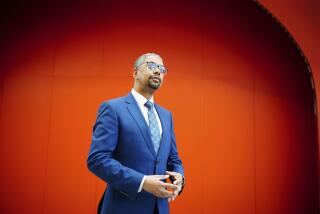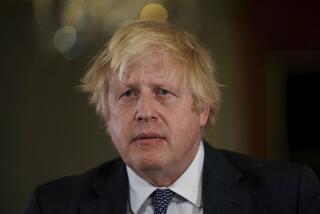Will There Always Be an England?
- Share via
LONDON — Back in the good olde days, no one had to ask what it meant to be English.
England was the dominant force in the United Kingdom, which was itself an imperial power. The English knew their place in the world and at home too, where gentlemen sat in the House of Lords and the working class labored in the factories.
But this tidy picture has so faded in the white light of modernization that the English no longer recognize themselves in it. Not only is the empire a bygone memory, and the tradition-bound House of Lords on its last leg, but elections for a Scottish Parliament and a Welsh Assembly have led to suspicions that the United Kingdom itself may also be a thing of the past one day.
And the assertion of Scottish and Welsh nationalism has thrown the English into a very un-English identity crisis.
The “Scottish Question” has given way to conferences on the “English Question” and to a slew of books and articles anxiously examining the English character. It also has created a backlash among some politicians who argue that a stronger English bloc in the Westminster Parliament, or even a separate English Parliament, is required to defend English interests against the Scots and Welsh.
With nationalists forming the opposition parties in Scottish, Welsh and, soon, Northern Irish governments, “only England has an opposition that still sees a future for a united Britain,” the Sunday Times lamented in a recent editorial. “This is a startling development, for these [nationalist] parties are now within reach of power.
“The House of Commons must get in on the federal act, holding English-only debates. [Conservative Party leader] William Hague . . . should bolster his position by pushing for English rights at Westminster.”
Teresa Gorman, a Conservative member of Parliament, is leading the charge for English rights. In her pamphlet, “A Parliament for England,” she argues that England will bear the lion’s share of the costs of the new legislatures but will have no say in how tax money is spent in Scotland, Wales and Northern Ireland.
“Westminster members will have no voice in matters devolved to the regions, whereas the Celts will be free to pontificate on English affairs,” Gorman writes.
The Scottish Parliament will have the power to levy some taxes and, like the Welsh Assembly, will make laws on issues such as education. But the Parliament in Westminster will still make foreign, defense and overall economic policy.
The English “have a strong sense of cultural worth, which is why they don’t have to go around crowing about it,” Gorman said in an interview. But under the Labor government vision of Britain in Europe, she added, “it looks as if England is being phased out.”
Her cause has drawn little support from the English public, which is far more interested in pocketbook issues such as health services than in anything like constitutional reform. The elite may ponder the English Question, but it is hardly a topic of conversation at pubs.
“The English are still dominant in the United Kingdom,” said Vernon Bogdanor, an Oxford University professor of politics and government. “Eighty-five percent of the population is English. I don’t think people feel particularly worried or threatened. The United Kingdom is still held together more strongly than people realize. It is not altered by devolution.”
Rosie Winterton, a Labor member of Parliament from Yorkshire, said she believes that there is a generational divide over the question of English identity.
“Older people tend to see it as being part of an island and quite special. There is the whole history of the empire and World War II, which understandably still makes a very big impression on the lives of older people,” she said.
Among those 40 and younger, “perhaps people see their Englishness as connected with things like the European Union . . . Britain within Europe. Because of television, travel, communications, there is a much wider perspective.”
Some Say There’s No Such Thing as England
Indeed, to some English people there is simply no such thing as England. It is Britain.
“England is a fiction,” Times columnist Simon Jenkins said in an interview. “England is the bits of Britain that are not identifiable as Wales and Scotland. There’s Yorkshire and Cornwall and London.”
The devolution of power to Scottish and Welsh governments is a logical reaction to 20 years of centralization and is nothing to fear, Jenkins said. An English Parliament, by contrast, makes no sense.
“You can separate limbs from a torso, but not a torso from its limbs,” he wrote in the Times. “England is the core of the United Kingdom.”
Auberon Waugh, son of English author Evelyn Waugh and editor of the Literary Review, agrees that England’s problem is not the strength of the Scots and Welsh. He thinks it is the rise of the middle class.
English culture “was the product of boarding schools that everyone of a certain class attended and which produced a deeply subversive attitude toward authority that was entirely English . . . a loathing of politicians and great suspicion of their motives,” Waugh said.
“What has spoilt it all is the coming of age of the common man. That has had the most profound effect on England. [It meant] the end of the old class system. . . . Americans have a genuine feeling of equality. Here no one really feels it--they just pretend,” he said.
Of course, some do not bother to pretend.
Peregrine Worsthorne, a newspaper commentator for the Daily Telegraph, says today’s increasingly “populist, classless England” is no longer fit for an English gentleman.
The monarchy is hardly worth its name, he says, hereditary peers are to be expunged from the House of Lords, and the country is ruled “by readers of the Sun” tabloid.
On top of that, the English countryside, whose beauty once inspired soldiers at war, has been brutalized to make way for suburban developments.
“What do they know of England who only know it as it is today?” Worsthorne wrote in the Telegraph. “How can any Englishman be expected to die for a nation-state that has allowed--even encouraged--such despoliation?”
Saddest of all, he wrote, is the change in national character, as seen in “the mass hysteria that followed the death of Diana, Princess of Wales, the bad behavior of British football hooligans and . . . the deeply ungracious reaction of the crowds at Wimbledon when a British player is beaten.”
But while traditionalists lament the change in English society, English society continues to change.
It was Tory Prime Minister Margaret Thatcher’s economic policy that fueled the expansion of the middle class in England and the rest of Britain, a generation that traded warm beer for cold Chardonnay and homey holidays in the Cotswolds for exotic journeys across the Channel.
Many Are Dining Out and Traveling Abroad
Once the reserve of a wealthy minority, dining out and foreign travel are now standard practices for middle England. Nearly 70% of Britons regularly eat in restaurants, compared with 43% two decades ago, according to a recent report by the Institute of Management, and some of them even enjoy good food; 7.7 million Britons have visited Spain--four times as many as in 1979.
These, undoubtedly, are the people who no longer have time for the English sport of cricket. Changing leisure habits--the spread of videos and the Internet--have fueled a precipitous decline in the popularity of cricket, says Guardian sportswriter Geoffrey Wheatcroft.
“In the golden summer of ‘47, there was no competition from television . . . or theme parks,” Wheatcroft wrote. “There is no question that its epic, Wagnerian time scale does not suit our age.”
If Thatcher gave birth to a well-fed, well-traveled middle class, Labor Prime Minister Tony Blair has nurtured it and made an ideology out of English upward mobility.
“Slowly but surely, the old establishment is being replaced by a new, larger, more meritocratic middle class,” Blair enthused in a speech early this year. “A middle class characterized by greater tolerance of difference, greater ambition to succeed, greater opportunities to earn a decent living. A middle class that will include millions of people who traditionally may see themselves as working class but whose ambitions are far broader than those of their parents and grandparents.”
In other words, class defined not by the old English gauges of accent, schooling and surname but by income and job description. According to the government, English classes are no longer divided between landowners and laborers; today, the “classes” are business-oriented, from owners of large companies, managers and professionals, salespeople and so on down the social ladder to the terminally unemployed.
And under Blair, any of those “commoners” might qualify for a seat in a revamped House of Lords.
Blair won election in 1997 by appealing to the Conservatives’ traditional base in middle England, which is not a place but the middle class that market analysts say now includes half of all Britons.
A middle Englander, in Labor parlance, is also called Mondeo Man, for the Ford Mondeo sedan he--or she--drives. Mondeo Man earns $32,000 a year or slightly more, has a traditional family and worries about financial security.
“When we talk about middle England,” Labor member of Parliament Winterton said, “we are talking about people who want to see a fair society but don’t want to see a very radical redistribution of wealth.”
Like many middle Englanders, Winterton said she thinks of herself as English, but like so many English people, she has trouble defining what that means.
“I was brought up in Yorkshire, but of course people there still think if you’re not born there, you’re not really from Yorkshire. Even if you arrived at 2, you’re a Johnny-come-lately,” she joked.
The reason people such as Winterton find it difficult to define their Englishness, insists author Iain Sinclair, is that English culture is a myth, an idealized vision of the countryside and of a society that appeared only in the books of Agatha Christie or P.G. Wodehouse.
“English? There aren’t any, apart from a few right-wing people who insist otherwise,” Sinclair said.
“Even the queen is not English. Her family was middle Europe, a mixture of German and Greek. There was a sense of Englishness during the war, when the . . . royal family were looked up to. But now they’re just another dysfunctional, mixed-up family like everyone else, but a little richer.”
So where does that leave the English identity?
In the garden, perhaps.
At the annual Chelsea Flower Show, the English express their aphorism that “you are closer to God in a garden.” Amid the alliums and hellebores--lilies to the non-English--gardeners insist that their pastime is a fundamental part of the English character.
“I get more pleasure out of a little packet of seeds than almost anything else,” said Gerard Downes, a 40ish gardener from the south of England. “After the aristocracy, gardening is one of the things still going.”
More to Read
Sign up for Essential California
The most important California stories and recommendations in your inbox every morning.
You may occasionally receive promotional content from the Los Angeles Times.













